Alla Pugacheva
Alla Borisovna Pugacheva (sometimes Pugachova;[lower-alpha 1], Hebrew: אלה בוריסובנה פוגצ'בה born 15 April 1949) is a Russian−Israeli musical performer. Her career started in 1965 and continues to this day, even though she has retired from performing. For her "clear mezzo-soprano and a full display of sincere emotions",[1] she enjoys an iconic status across the former Soviet Union as the most successful Soviet performer[2][3] in terms of record sales and popularity.[lower-alpha 2]
Alla Pugacheva | |
|---|---|
Алла Пугачёва | |
.jpg.webp) Pugacheva performing in 2016 | |
| Pronunciation | IPA: [ˈalːə pʊɡɐˈtɕɵvə] |
| Born | Alla Borisovna Pugacheva 15 April 1949 |
| Other names | Boris Gorbonos |
| Citizenship |
|
| Occupation | Singer
|
| Years active | 1965–present |
| Notable work | Discography |
| Title | People's Artist of the USSR |
| Political party | |
| Spouses | Mykolas Orbakas
(m. 1969; div. 1973)Yevgeniy Boldin
(m. 1985; div. 1993) |
| Children | 3, including Kristina Orbakaitė |
| Musical career | |
| Genres | |
| Instrument(s) |
|
| Labels | |
| Signature | |
 | |
Pugacheva's repertoire includes over 500 songs in Russian, English, German, French, Kazakh, Hebrew, Finnish, and Ukrainian, and her discography has more than 100 records, CDs and DVDs. In addition to Russia and the former Soviet Union, Pugacheva's albums were released in Japan, Korea, Sweden, Finland, Germany, Poland, Czechoslovakia and Bulgaria. In total, Pugacheva has sold more than 250 million records.[4]
She became a People's Artist of the USSR in 1991, a Laureate of the State Prize of the Russian Federation in 1995, and was decorated as a Chevalier of the Order "For Merit to the Fatherland" II, III and IV degrees. She represented Russia in the Eurovision Song Contest 1997 with the song "Primadonna", finishing in 15th place.[5]
Early life and education
Pugacheva was born to Boris Mikhailovich Pugachëv and Zinaida Arkhipovna (born Odegova) Pugachëva in Moscow, on 15 April 1949.[6] In 1956, she enrolled in music school No.31, and attended the Ippolitov-Ivanov music college. She went on to study at school No.496, finishing her studies there in 1964. She then studied in the choral-conducting department of the college. Pugacheva recorded her first track "Robot" in 1965, for a morning programme on Radio Yunost.[7]
Career
Pugacheva finished college in 1966 and subsequently toured with the group Yunost' (Youth) in western Siberia. The following year she began working as a piano accompanist at the State Circus Musical college. She provided the leading vocals to a number of bands, including Novy Elektron (New Electron), part of the Lipetsk State Philharmonic Society, in 1966, Moskvichi (Muscovites) in 1971, Oleg Lundstrem's band in 1972–73, and Vesyolye Rebyata (Merry Folks) in 1974–75. She recorded songs throughout that period for numerous movies.[8]
In 1974, she came in 3rd place in the All-Union competition of musicians. In 1975, she received the Grand Prix of the Golden Orpheus international singing contest in Bulgaria, performing the song "Harlequin" by Emil Dimitrov. The Amiga label released her winning song as a single in East Germany. Subsequently, in Bulgaria, the Balkanton label released the live recording of "Harlequin" from the festival as a single. A year later, Pugacheva returned to the Golden Orpheus to perform a concert outside the competition. The Balkanton released the live tracks as Pugacheva's first album Zolotoy Orfey 76. In that same year, Pugacheva recorded a number of songs for the musical drama-comedy The Irony of Fate as the singing voice of Nadja, the female protagonist.
The Woman Who Sings, 1977
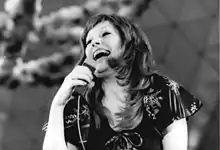
Pugacheva went on to work on the musical film The Woman who Sings in cooperation with the band Ritm (Rhythm) in 1977. She played the leading lady, a famous pop singer who sacrifices her personal life for her career. The soundtrack, which was co-written by Pugacheva and composed of pop songs, culminated with the dramatic title ballad "Zhenshchina, kotoraya poyot". The Soviet audience, regarding the film as autobiographical,[9] brought the soundtrack to reach record audience of the year in 1979, as it was bought by 55 million people.[10] The soundtrack was first released in 1977 as part of the double album Zerkalo dushi (Mirror of the Soul), which was a collection of her songs from 1975 to 1977. The Victor label released a collection album Alla Pugacheva in the same year in Japan. In 1978, performing the song "Vsyo mogut koroli" ("Kings Can Do Anything"), Pugacheva received the Amber Nightingale prize at the Sopot International Song Festival which at the time meant automatically winning the Grand Prix of the Intervision Song Contest.[11] In 1980, the Kansan label of Finland released her above-listed works as the compilation album Huipulla (At the Top). Tonbandausnahmenkompanie Bayer GmbH did the same in West Germany, releasing Alla Pugachova.
Stockholm, 1980–2000
During the 1980s, Pugacheva was a frequent visitor to Stockholm. She started out with multiple guest appearances on the popular Swedish radio show Galaxen (April 1980 year) conducted by Jacob Dahlin, and later frequently appeared on his TV show Jacobs Stege (Jacob's Ladder). Dahlin and Pugacheva used to perform duets, such as "Superman" where Dahlin sings as the title character. In Stockholm, Pugacheva recorded an album in English, released by the World Record Music label in Sweden as Watch Out and by the Melodiya label in the Soviet Union as Alla Pugacheva in Stockholm.
Pugacheva had sold a quarter of a billion records by 2000, in 2023 one of her songs were used for Atomic Heart for the intro.[12]
Private life
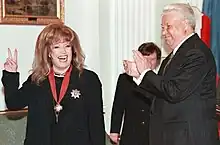
In 1969, she married Lithuanian circus performer Mykolas Orbakas, and on 25 May 1971 she gave birth to a daughter, Kristina Orbakaitė, who is also a popular singer.[13] Pugacheva divorced Orbakas after four years of marriage in 1973. She married film director Alexander Stefanovich (1945–2021) in 1976 and starred in several of his movies. The union was dissolved in 1980.
In 1985, Pugacheva married producer Yevgeniy Boldin, with whom she had numerous professional collaborations. She had a working and romantic relationship with a young musician and singer, Vladimir Kuzmin during this period. In 1993, she divorced Yevgeniy Boldin stating that their professional lives interfered too much with their personal life.
In 1994, she married a pop singer, Philipp Kirkorov. Their divorce was announced in November 2005.
On 23 December 2011, Pugacheva married satirist Maxim Galkin, who is 27 years younger.[14] The couple has twins delivered by a surrogate mother.
Gay icon
Alla is considered to be a gay icon in Russia by Russian LGBT community.[15][16][17][18][19]
Commentary on war in Ukraine
In March 2014, Pugacheva signed a petition against the persecution of Andrei Makarevich, who protested against the annexation of Crimea and war in Donbas.[20]
In March 2022, Pugacheva and Galkin left Russia for Israel following the 2022 Russian invasion of Ukraine.[21] In August 2022, Pugacheva returned to Russia, saying "she would clean up the mess in my head, in people heads".[22] In September 2022, after her husband had been declared a "foreign agent", she spoke out publicly condemning the war and useless deaths of Russian men who are forced to die for illusory reasons. She also demanded Ministry of Justice to declare her a foreign agent, too.[23][24]
Прошу зачислить меня в ряды иноагентов моей любимой страны, ибо я солидарна со своим мужем, честным, порядочным и искренним человеком, настоящим и неподкупным патриотом России, желающим Родине процветания, мирной жизни, свободы слова и прекращения гибели наших ребят за иллюзорные цели, делающие нашу страну изгоем и утяжеляющие жизнь наших граждан.I ask to enlist me in the list of foreign agents of my beloved country, because I'm solidary with my husband, an honest, decent and sincere person, a true and incorruptible patriot of Russia which wishes the Motherland prosperity, peaceful life, freedom of speech and an end of the deaths of our men for the illusory goals that make our country an outcast and make life difficult for our citizens.—Alla Pugacheva on War in Ukraine, September 18, 2022[25][26]
Russian authorities began investigating Pugacheva for "discrediting" the Russian military under Russian 2022 war censorship laws.[27] In October 2022, Pugacheva revealed that she had left Russia again for Israel.[28][29][30]
Honours and awards
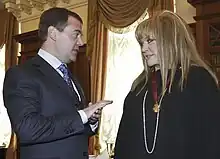
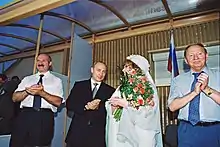
Pugacheva's most notable title is "People's Artist of the USSR", the highest honor that could be bestowed to a musical artist in the state, awarded to her in 1991. While the lesser titles of "Accomplished Artist of the Russian SFSR", and "People's Artist of the Russian SFSR" had been already awarded to her in 1980 and 1985 respectively, the government was hesitant to award her its highest honor, reportedly largely because of statements and actions on her part that were inconsistent with the Party's agenda.[31] Pugacheva is listed in the Russian Encyclopedia (2005).[32]
On 15 April 2009, her 60th birthday President of Russia Dmitry Medvedev awarded Pugacheva the 3rd Degree Order of Merit for the Fatherland.
She was honored as one of the BBC 100 Women in December 2022.[33]
- Orders
 Order "For Merit to the Fatherland", 2nd class (15 April 1999)
Order "For Merit to the Fatherland", 2nd class (15 April 1999) Order "For Merit to the Fatherland", 3rd class (15 April 2009)
Order "For Merit to the Fatherland", 3rd class (15 April 2009) Order "For Merit to the Fatherland", 4th class (17 April 2014)
Order "For Merit to the Fatherland", 4th class (17 April 2014) Order of St. Mesrop Mashtots (Armenia, 26 September 2009)
Order of St. Mesrop Mashtots (Armenia, 26 September 2009) Dostlug Order (Azerbaijan, 4 September 2009)
Dostlug Order (Azerbaijan, 4 September 2009)
- Titles
- People's Artist of the USSR (20 December 1991)
- People's Artist of the RSFSR (1985)
- Honored Artist of the RSFSR (1980)
- Honorary citizen of the city of Makhachkala (2006)
- Awards
- State Prize of the Russian Federation (7 June 1995) – For outstanding contribution to the development of literature and art
- Belarus president award Through Art – to Peace and Understanding (7 July 2006)
Discography
Famous songs
- «Две звезды» (Two stars)
- «Я тебя поцеловала» (I kissed you)
- «Миллионы алых роз» (Millions of scarlet Roses)
- «Папа купил автомобиль» (Dad bought a car)
- «Мадам Брошкина» (Madame Broshkina)
- «Осенний поцелуй» (Autumn Kiss)
- «Осторожно листопад» (Careful leaf fall)
- «Песенка про себя (Также как все)» (A song about myself (Just like everyone else))
- «На Тихорецкую состав отправится» (The train will go to Tikhoretskaya)
- «100 друзей» (100 friends)
- «Айсберг» (Iceberg)
- «Волшебник-недоучка» (The half-educated Wizard)
- «Всё могут короли» (Kings can do anything)
- «Старинные часы» (Vintage watch)
- «Маэстро» (Maestro)
- «Позови меня с собой» (Call me with)
- «Арлекино» (Harlequin)
- «Любовь, похожая на сон» (Love, like a dream)
Original solo albums
| Year (P) | Number | Original title | Title in English | Format | Label, country |
|---|---|---|---|---|---|
| 1976 | Золотой Орфей 76 | Golden Orpheus 76 | Live LP | Balkanton, Bulgaria | |
| 1977 | C60 09799-2 | Зеркало души | The Mirror of the Soul* | Double LP | Melodiya, USSR |
| 1979 | C60 11975-6 | Арлекино и другие | Harlequin and Other Songs* | LP | |
| 1980 | C60 14429-0 | Поднимись над суетой | Be Beyond a Fuss of Life* | ||
| 1980 | C60 14935-6 | То ли ещё будет | Something's Still to Come* | ||
| 1982 | C60 17663-6 | Как тревожен этот путь | How Disturbing Is This Way* | Double | |
| 1985 | C90 21357-8 | Ах, как хочется жить | Ah, How I Want to Live | LP | |
| 1985 | WRM LP01 | Watch Out | Watch Out | World Record Music, Sweden | |
| 1986 | C60 24717-8 | ...счастья в личной жизни! | ...and Happiness in Private Life* | Melodiya, USSR | |
| 1986 | C60 25059-0 | Пришла и говорю | I'm Here Talking to You* | ||
| 1990 | SUCD 60 00122 | Алла | Alla | CD | |
| 1991 | 10191-40191 | Рождественские встречи 1990 | Christmas meetings 1990 | 2LP | Russian disc, USSR |
| 1992 | STEREO R60 00887 | Рождественские встречи 1991 | Christmas meetings 1991 | Russian disc, Russia | |
| 1995 | SZCD0475 | Не делайте мне больно, господа! | Don't Hurt Me, Gentlemen | CD | Soyuz, Russia |
| 1998 | Ex 98073 | Да! | Yes! | Extraphone, Russia | |
| 2001 | АБП 0037 | Речной трамвайчик | River Tram | Alla, Russia | |
| 2002 | АБП 0038 | А был ли мальчик | Was There a Boy? | ||
| 2003 | АБП 0055,
МТ 702909-288-1 |
Живи спокойно, страна! | Live Peacefully, My Country! | Alla & Monolit, Russia | |
| 2008 | АБП 0055,
МТ 702909-288-1 |
Приглашение на закат | Invitation to a Sunset | Alla |
* Official English title.
Other albums
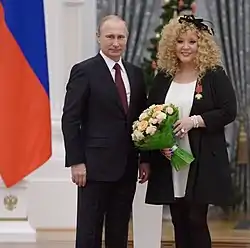

- 1978 Alla Pugacheva (released in Japan) – compilation
- 1978 Ala Pugachova. Ogledalo na dushata (released in Bulgaria) – compilation
- 1979 Alla Pugacheva i Iosif Kobzon – split
- 1980 Diskoteka A – instrumental remixes
- 1980 Alla Pugatšova. Huipulla (Alla Pugacheva. At the Top; Kansan, Finland)
- 1980 Alla Pugačevova. Zrcadlo duše (Czech version of Zerkalo dushi)
- 1981 Alla Pugačova (Czech version of To li eshche budet...)
- 1981 Alla Pugatšova. Tähtikesä (Alla Pugacheva. Starry summer; Kansan, Finland)
- 1982 U nas v gostjakh maestro (Our Guest is the Maestro) – live / split
- 1982 Parad Planet – split
- 1983 Million Roz (released in Japan) – compilation
- 1983 Alla Pugačova. Dávná píseň (a Czech compilation)
- 1984 Alla Pugacheva – Soviet Superstar. Greatest Hits 1976–84 (World Record Music, Sweden) – compilation
- 1985 Alla Pugacheva – Soviet Superstar vol.2 (released by the World Record Music in Finland) – compilation
- 1988 Pesni vmesto pisem (Songs Instead Of Letters) – split with Udo Lindenberg
- 1989 Paromshik – (Ferryman) (Finnish release of Rechnoy paromshchik)
- 1991 Alla (Ritonis, Riga)
- 1994 Veryu v tebya (I Believe in You) – compilation
- 1995 Put' zvezdy (The Path of a Star) – compilation
- 1996 A 13 CD compilation of songs previously released only on LP and MC
- 1996 Poët Alla Pugacheva (Alla Pugacheva Sings; songs by Aleksandr Zazepin) – compilation
- 1997 Dve zvezdy (Two Stars; with Vladimir Kuzmin) – compilation / split
- 1998 Syurpriz ot Ally Pugachevy (Surprise from Alla Pugacheva) – tribute
CD singles
- 1997 Primadonna (Eurovision 1997)
- 2000 Bely sneg (White Snow)
- 2000 Madam Broshkina
- 2002 Eto lyubov (It's Love)
There is an unknown number of single and EP releases published all over the world.
Films and TV appearances
- 1978 Teatr Ally Pugachevoy, Estonian Television
- 1978 The Woman who Sings, Mosfilm
- 1981 Lyubovyu za lyubov' (Love For Love) Mosfilm
- 1984 Vstrechi s Alloy Pugachevoy (Meetings with Alla Pugacheva), USSR TV
- 1985 Prishla i govoryu (I Came and I'm Speaking), Mosfilm
- 1985 Sezon chudes (Season of Miracles), Odesa Film Studio
- 1989–2002 Rozhdestvenskie vstrechi (Christmas Meetings), USSR TV, Ostankino, Public Russian Television, Russian State Television
- 1995 Zhdi i pomni menya (Wait for Me, Remember Me), Public Russian Television
- 1997 Laat de Leeuw (Late de Leeuw), VARA[34]
- 2003 Za dvumya zaytsami (Chasing Two Rabbits)
See also
Notes
- Russian: Алла Борисовна Пугачёва, romanized: Alla Borisovna Pugachyova , IPA: [ˈalːə bɐˈrʲisəvnə pʊɡɐˈtɕɵvə] .
- Encyclopædia Britannica repeats a claim on its features website that Pugacheva has sold around 250 million records. Other internet sources claim figures from 75 million to 250 million records, though there is no official source for this information.
References
- "ВРЕМЯ Z" – журнал для интеллектуальной элиты общества [Time Z – Journal for the intellectual elite of the society] (in Russian). 13 November 2006. Archived from the original on 14 February 2009. Retrieved 23 May 2009.
- Alison Smale (28 February 2000). "A Superstar Evokes a Superpower; In Diva's Voice, Adoring Fans Hear Echoes of Soviet Days". The New York Times. Archived from the original on 28 March 2019. Retrieved 17 April 2012.
- Jon Pareles (25 September 1988). "Review/Music; Alla Pugacheva's Moody, Ardent Soviet Pop". The New York Times. Archived from the original on 28 March 2019. Retrieved 17 April 2012.
- Susan Doll. "Alla Pugacheva". Encyclopædia Britannica. Retrieved 3 July 2019.
- Всем шоу шоу [All show show]. Archived from the original on 9 September 2012. Retrieved 5 December 2015.
- Alla Pugacheva Archived 16 February 2017 at the Wayback Machine. IMDb. Retrieved 27 June 2010.
- "US rocks to a Soviet beat. Superstar vocalist Alla Pugacheva tours the States". Christian Science Monitor. ISSN 0882-7729. Retrieved 7 February 2023.
- Collection of her songs from movies Archived 11 March 2005 at the Wayback Machine, russiandvd.com. Retrieved 10 October 2013.
- «Женщина, которая поет»: кто такой Борис Горбонос? ["The Woman Who Sings": Who Is Boris Gorbonos?]. volgograd-trv.ru (in Russian). 17 April 2009. Archived from the original on 5 December 2011. Retrieved 22 May 2009.
- Лидеры проката [Top bill]. Kinokultura.com (in Russian). Archived from the original on 10 May 2012. Retrieved 22 May 2009.
- Międzynarodowy Festiwal Piosenki Polskiej- Sopot Festival Archived 2 January 2007 at the Wayback Machine, pesnyagoda.by.ru. Retrieved 17 May 2015.(in Russian)
- Smorodinskaya (28 October 2013). Encyclopaedia of Contemporary Russian. Routledge. ISBN 978-1-136-78786-7.
- Goscilo, Helena; Strukov, Vlad (4 October 2010). Celebrity and Glamour in Contemporary Russia: Shocking Chic. ISBN 9781136924347. Archived from the original on 15 March 2017. Retrieved 13 November 2016.
- "Алла Пугачева и Максим Галкин поженились (ФОТО)" [Alla Pugacheva and Maxim Galkin got married (PHOTO)]. Mail.ru. 26 December 2011. Archived from the original on 11 June 2015. Retrieved 28 December 2011.
- Gasparyan, Artur (22 April 2005). "Рождество Пугачево". Moskovskij Komsomolets (in Russian). Retrieved 26 April 2023.
- "Гей-сообщество России считает Аллу Пугачеву своей иконой". Pskovskaya lenta novostej (in Russian). 15 April 2010. Retrieved 26 April 2023.
- "Алла Пугачева и Мадонна – гей-иконы современности". TV Rain (in Russian). 18 April 2012. Retrieved 26 April 2023.
- Langenburg, Artyom (15 April 2014). "Хочу как Алла: от бизнесвумен до гей-иконы". Sobaka.ru (in Russian). Archived from the original on 7 December 2021. Retrieved 25 September 2023.
- Konakov, Boris (8 October 2020). "Осквернение святынь. Что не так с гей-иконами в России?". AIDS.Center (in Russian). Archived from the original on 27 April 2022. Retrieved 25 September 2023.
- Pugachev and other leaders are asked to stop harassment by Makarevich Crimea Archived 11 September 2016 at the Wayback Machine, Ukrayinska Pravda (28 March 2014)
- "Russian Megastars Alla Pugacheva, Maxim Galkin Flee to Israel". Haaretz. 24 March 2022. Archived from the original on 24 March 2022. Retrieved 24 March 2022.
- "Вернувшаяся в Россию Пугачева пообещала "наводить порядок"" [Returning to Russia, Pugacheva promised to “put things in order”]. RIA Novosti (in Russian). 27 August 2022. Archived from the original on 28 August 2022. Retrieved 28 August 2022.
- "Russian pop star's war criticism stirs vigorous debate". AP NEWS. 19 September 2022. Retrieved 4 October 2022.
- Troianovski, Anton (18 September 2022). "Russian Pop Music Icon Comes Out Against the War in Ukraine". The New York Times. ISSN 0362-4331. Archived from the original on 18 September 2022. Retrieved 18 September 2022.
- "«Миллион алых роз против сил зла»: как в России отреагировали на антивоенный пост Пугачёвой" (in Russian). BBC News Russian. 19 September 2022. Retrieved 11 April 2023.
- "Восстание Пугачёвой приведёт к падению режима" (in Russian). Meduza. 19 September 2022. Retrieved 20 September 2022.
- "Russian pop legend Alla Pugacheva under investigation for 'discrediting' Russian army". Meduza. 20 September 2022.
- "Russian pop star who criticised Ukraine war says she is in Israel". the Guardian. 10 October 2022. Retrieved 10 October 2022.
- Boutsko, A. (4 May 2022). "Who are the Russians leaving their country?". Deutsche Welle. Retrieved 13 November 2022.
- Tarasova, Darya (19 September 2022). "Russian pop legend speaks out against war in Ukraine". CNN. Retrieved 22 January 2023.
- Alla Pugacheva biography Archived 16 April 2009 at the Wayback Machine, artistdirect.com. Retrieved 17 May 2015.
- Profile Archived 8 June 2015 at the Wayback Machine, intermedia.ru. Retrieved 8 June 2015.
- "BBC 100 Women 2022: Who is on the list this year?". BBC News. Retrieved 10 December 2022.
- Archived at Ghostarchive and the Wayback Machine: "Eurovision - Alla Pugacheva / Алла Пугачёва 1997". YouTube.